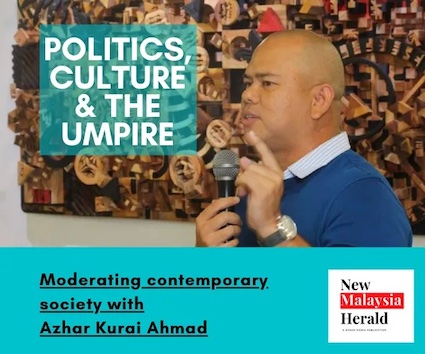What Happens When Professors Are Lacking In Intellectual Capacity?

By Azhar Kurai, New Malaysia Herald
The media is integral in shaping public opinion. In the fight to control mainstream media, the winner holds the upper hand in setting the narrative to suit their agenda ~ be it political, cultural, or economical. Although the rise of social media provides alternative outlets, for instance, a single tweet from tech billionaire Elon Musk can make or break the stock market, the importance of mainstream media still can’t be refuted.
For the longest time, the mainstream media in Malaysia used to be in the hands of the government. But as we go through society changes, including a couple of government switches already, what used to be black and white, has turned into several shades of greys. Is TV3 supporting Mahathir or Muhyiddin or Najib or neither? How Malay is The Malay Mail nowadays?
People say we always deserve what we get. When it comes to politicians, the corrupt ones reflect who we are as a society, always ready to bribe the policemen to get our way out of a traffic summon, or offering kickbacks to government officials to get that big contract of a lifetime. Likewise, as a society, we deserve to get the media we have, with our penchant for only reading headlines, and sometimes completely ignoring the content, and worse, never bothering to dissect, debate, and respond to the issues at hand intellectually.
Which brings us neatly to the topic in hand, on the role of intellectuals in shaping public opinion through the media.
But first, who are these intellectuals in our society? Perhaps this is best described by that giant of Malaysian intellectual himself, the late Professor Syed Hussein Alatas in his 1977 book, “Intellectuals in Developing Societies”. He said, “an intellectual is a person who is engaged in thinking about ideas and non-material problems using the faculty of reason.” The possession of a degree does not make one an intellectual, although they often coincide. On the contrary, a person with no academic qualifications can be an intellectual if he/she utilises his/her thinking capacity, and possesses sufficient knowledge in the subject of interest. Bill Gates, by this definition, is an intellectual, although he is devoid of a college degree.
A Clear Distinction
Professor Syed also made a clear distinction between intellectuals and intelligentsia, the latter referring to those who have acquired higher formal education by modern standards.
In short, all professors are part of the intelligentsia of a society, but not all professors are intellectuals. Allow The Umpire to demonstrate this clearer with the following two exhibits.
Exhibit 1: Professor Syed Hussein Alatas is an intellectual. Here was a man who was regarded as one of the founders of sociological investigation in South East Asia, was instrumental in drafting the Rukunegara, and formed GERAKAN as a political vehicle for him to effect positive changes to our society. All that, and on top of writing books such as, “Myth of the Lazy Native”, his own rebuke to imperialism.
In contrast, Professor Tajuddin Rasdi is not an intellectual. He is merely a part of the local intelligentsia. This is Exhibit 2.

